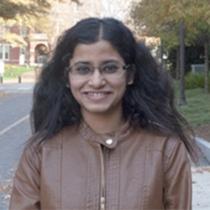
Adyasha Mohanty
What is your next adventure?
I will be starting my graduate program with Prof. P. K. Yeung focusing on direct numerical simulation of turbulence and turbulent flow. We will be using GPUs to conduct the largest simulations in the world. My intent is to earn a Ph.D.
What about your next adventure are you most looking forward to?
There will be far fewer classes, which will allow me to focus more on research, which will allow me to go in depth. I love the area of turbulence and because the problems I am tackling are called 'the unsolvable problems of classical physics' I am very excited.
I am also excited about being a TA, because I have never been a TA. I look forward to mentoring others
Did you have any previous co-op, internship, or research experience in this area?
I started doing research my first semester -- at the Aerospace Systems Design Lab -- and I've been going ever since. I'd heard about ASDL projects at an open house, and since I came here to learn about space, I immediately asked. I started with a project on parameter modeling of space vehicles. I also did a Grand Challenge on drones and UAVs and a Vertically Integrated Project (VIP) that gave me my first hands-on experience with 3D printing, CAD, and laser cutters. We needed them for the design competition.
As a sophomore I interned at a Asteria Aerospace, a UAV company in India that was started and owned by an ASDL grad (Neel Mehta). I did systems integration and testing for my first internship there. Then I went back in the summer to do work on the systems, avionics, and mapping teams. My junior year, I went back to ASDL to work on a drone project where we did experimental characterization of batteries, propellors, and motors. That's when I was introduced to turbulence. I asked a Ph.D. student about what it involved and he said that we use super computers to simulate things turbulence subjected to magnetic fields. He told me that Dr. Yeung was doing work in that area, so I went to Dr. Yeung. He gave me a brief overview, which kind of scared me, because at the end, he gave me three textbooks so I could understand turbulence and learn Fortran, which is what he used to perform simulations. It was very challenging. It was very scary. And it was exactly why I came to Georgia Tech.
The summer of my junior year I began doing research with Dr. Yeung - focusing on direct numerical simulation of isotropic turbulence. I also got an understanding of the nature of velocity gradients and probability density functions. With the help of a PURA grant, I did an independent study last summer studying the lagrangian method. One of his Ph.D. students in Germany set up the process so that I could write codes. It was my first time. By the end of the summer we had results that showed that Brownian motion is more dominant than fluid advection at high molecule diffusivity.
How did your educational experience at Georgia Tech help you to achieve your goals?
First of all, the vigor, the level at which we are challenged, every day, in every exam, in every class. Every day, I woke up thinking: 'how will I be more challenged than I was yesterday?'
Secondly, because I'm an international student, I didn't know what my opportunities would be for research or internships. But Tech does a great job setting you up to find opportunities. I worked on a Grand Challenge with NASA and I received a PURA to do my own research.
Lastly, Tech really encouraged me to network with other AE grads and other Tech grads. And that's how I got my internship.
What advice would you give to an underclassman who would like to follow the same path?
I think the most important things is to have a mindset and the willpower to know that you can do it.
A lot of times, at Tech, I took 18-20 hours of credit each semester. I heard a lot of discouraging things about that -- about how no one's ever done that. But, in my mind, if no one has done it yet, then there's a place for me to do it first. And I did it. I finished my undergraduate degree in three-and-a-half years. And I had support when I needed it, but, also, no one stopped me.
The other thing I'd say is that you should not come to Tech with one rigid idea of what you will learn. I came because I wanted only to study space. I'd never heard of turbulence. Once I found it, I found what I wanted to study for a long time.
Lastly, find a study group - a group of AE friends who will stick behind you no matter what. And get a mentor, someone who can point things out to you when you need direction.
If you want to be an aerospace engineering student at Tech, you have to wake up every day wanting to be challenged.